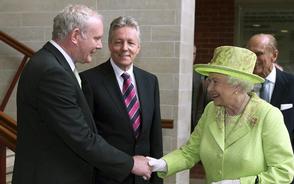 On June 27, 2012 former Irish Republican Army commander Martin McGuinness and Queen Elizabeth II of Great Britain shook hands in Northern Ireland, helping to solidify the peace established by the Good Friday agreement of 1998. The event made news worldwide, from Al Jazeera to the New York Times, which called it “the most improbable of encounters.” McGuinness is now Northern Ireland’s Deputy First Prime Minister.
On June 27, 2012 former Irish Republican Army commander Martin McGuinness and Queen Elizabeth II of Great Britain shook hands in Northern Ireland, helping to solidify the peace established by the Good Friday agreement of 1998. The event made news worldwide, from Al Jazeera to the New York Times, which called it “the most improbable of encounters.” McGuinness is now Northern Ireland’s Deputy First Prime Minister.
The Good Friday Agreement ended decades of violent conflict between Catholics and Protestants in Northern Ireland. Nongovernmental groups are widely credited with laying the groundwork for the agreement through “Track II Diplomacy,” where private individuals meet unofficially with parties to a conflict to encourage negotiations and help create a workable agenda. According to Foreign Policy, U.S. organizations were instrumental in developing this kind of peacebuilding.
It is ironic that, after the success of Track II Diplomacy in places like Ireland and South Africa, U.S. peacebuilding organizations are now prohibited from talking with groups on U.S. terrorist lists in efforts to turn them away from violence and to toward negotiations and political processes. The legal prohibition on material support of terrorism explicitly forbids non-tangible speech such as “training” or “expert advice and assistance” that are necessary to successful Track II Diplomacy. The Supreme Court upheld application of the law to peacebuilding in June 2010 in its infamous Humanitarian Law Project (HLP) decision.
The second anniversary of the HLP decision was June 21, just a few days before the Queen and rebel shook hands. The Charity & Security Network marked it with a webcast where experts talked about the state of Track II Diplomacy two years later, noting lost opportunities for peace. Melanie Greenberg, President and CEO of the Alliance for Peacebuilding, explained how Track II works and why it is important for nongovernmental parties to have confidential and free contact with parties to conflicts for it to work. (You can see the webcast here – Ms. Greenberg’s remarks are at the 11:40 minute point.)
While the legal prohibition is very broad, the law does provide for exceptions in cases where activities do not contribute to terrorism. In May 2011 a group of 45 former diplomats, foreign policy experts, peacebuilders and civil liberties groups wrote to Secretary of State Hillary Clinton asking her to use her power to grant exceptions for Track II Diplomacy and other peacebuilding activities.
So far she has taken no action. However, there are signs that the State Department understands the advantages of dialog in resolving disputes. During the same week as the anniversary of the HLP decision the State Department met with Hani Nour Eldin, a newly elected member of Egypt’s Parliament who is a member of Gama Islamyya, which is on the U.S. list of terrorist groups. State Department spokeswoman Victoria Nuland defended the meeting from criticism, saying exceptions can be made when it is in the U.S. interests to do so. She noted that Eldin himself posed no security threat and future relations with Egypt would benefit from dialog.
This is a good example of why Secretary Clinton should grant a general exception for Track II Diplomacy. U.S. peacebuilding organizations are world leaders in this area, and barring their participation is a significant lost opportunity for peace. Who knows, perhaps someday the Prime Ministers of Israel and Palestine will be shaking hands for the cameras. The sooner an exception for Track II Diplomacy is granted, the sooner that day will come.
